Thursday, July 24, 2025. Annette’s Roundup for Democracy.
5 articles on Trump today.
1. What the public thinks.
2. Epstein.
3. Epstein.
4. Epstein
5. Trump’s tariffs and lies.
1. Behind the Curtain: Losing by winning

This paradox is unfolding in what could be the very best chapter of his presidency, before tariffs push prices higher or midterms pose risks to his GOP majorities.
- And it's being aggravated by the Jeffrey Epstein scandal, which has exposed rare cracks in Trump's decade-old MAGA movement.
What the polls say: One poll is meaningless. But a bunch of credible polls, showing the same thing, are worth paying attention to. And almost all of them show big majorities opposed to provisions of the "One Big Beautiful Bill" ... and harsh immigration crackdown ... and high tariffs ... and pardons for Jan. 6 convicts ... and wild improvisation with Russia.
- Trump was underwater (more unpopular than popular) on issue after issue in a CBS News/YouGov poll out Sunday, with broad disapproval on his handling of the economy: 70% of those polled said his administration wasn't doing enough to lower prices, and 61% said it was putting too much focus on tariffs.
On the administration's deportations of immigrants in the U.S. illegally, the CBS News/YouGov poll found overall support dropping 10 points over the past five months (59% to 49%). The GOP base remains overwhelmingly supportive, but a CNN poll found a 10-point increase (45% to 55%) in U.S. adults who say Trump has gone too far on deportations.
Some Trump advisers believe the deportations are more popular than polls reflect, based on some people's unwillingness to tell pollsters their true views on the issue.
On Trump's megabill, an AP-NORC poll found more adults think the new tax and spending law will benefit the wealthy (64%) than think it helps the middle class or "people like you" (51% each). The percentage who approved of Trump's handling of government spending (38%) was down 8 points from March.
Trump's handling of the Epstein case presents the latest — and so far greatest — threat to his public image: A new YouGov poll gave Trump a net rating of -34, his worst on any major issue this term. The backlash has dragged on for more than three weeks, fueled by Trump's escalating conflict with his own MAGA base.
Zoom in: Buyer's remorse appears especially concentrated among Gen Z voters, whose extraordinary shift toward Trump in 2024 spawned existential panic inside the Democratic Party.
Trump's net approval rating among 18- to 29-year-olds has plummeted to -40 since inauguration, down from roughly even, according to pollster G. Elliott Morris.
Reality check: Unhappiness with Trump hasn't turned into popularity for Democrats. In a CNN poll out last week, just 28% of Americans had a favorable view of the Democratic Party — the low point in more than 30 years of CNN polling.
Basically, everyone dislikes everyone and everything.
Between the lines: Some of Trump's unpopularity reflects the law of thermostatic public opinion — voters demand change, then flinch when it arrives too fast or too hard, Axios' Zachary Basu notes.
Take immigration: With the border having gone quiet, scrutiny has turned to Trump's interior crackdown and the deportation of non-criminal migrants — including hundreds of thousands of noncitizens who are here legally and have lived in the U.S. for years.
MAGA hardliners may love the public spectacle of "Alligator Alcatraz." But for many middle-ground voters — including podcaster Joe Rogan — the optics are too much to stomach.
In other cases, Trump set lofty expectations that haven't been met.
The war in Ukraine, which Trump promised to end within 24 hours of taking office, rages on. So does the war in Gaza. And in a remarkable break with isolationist allies, Trump joined forces with Israel last month to bomb Iran's nuclear program.
His pledge to "rapidly drive prices down" has also hit roadblocks: Inflation ticked up in June, complicating the Fed's path to rate cuts even before a new era of global tariffs kicks in next month.
Trump's botched promise not to touch Medicaid could haunt the GOP for years: 10 million people are projected to lose health coverage over the next decade because of the megabill's steep cuts to federal health spending, according to the Congressional Budget Office.
CBO says that over the next decade, the megabill is expected to add at least $3 trillion to the national debt that Republicans once cared so much about.
Behind the scenes: In private, Trump gripes about not getting sufficient credit for defying expectations and historic norms. He's imposing his will on the nation — yet the media and even MAGA fixate on the blemishes. But what if his ideas are authentically unpopular?
A longtime Trump adviser told us the president's view is: Why don't they trust me? What more can I do?
What to watch: Trump aides are making extensive plans to showcase popular parts of the megabill — notably tax-cut extensions, plus new tax deductions for tips and overtime, and auto-interest loans for new vehicles assembled in the U.S.
But Republicans are having trouble selling the package's popular provisions because the Epstein saga has taken over. House Republicans tell Axios' Alex Isenstadt their constituents are fixated on Epstein, not the bill.
Trump lamented Tuesday on Truth Social: "We had the Greatest Six Months of any President in the History of our Country, and all the Fake News wants to talk about is the Jeffrey Epstein Hoax!"
The bottom line: Trump advisers tell us that what will matter for the long run is how the economy is treating everyday Americans when it comes time for midterm voting in 2026, and the choice of Trump's successor in 2028.
Go deeper ... "Behind the Curtain: Trump's immigration peril."
2.Trump Should Be Panicking over Epstein
Desperate moves heighten danger for MAGA politicians
If you thought the Trump squad’s deal to conditionally dismiss New York Mayor Eric Adams’s multiple corruption charges in exchange for assistance in the lawless onslaught against immigrants was a “corrupt bargain,” as many attorneys in the South District of New York U.S. attorney’s office and Main Justice did, buckle up. A potential, disgusting deal between the Trump regime and Ghislaine Maxwell, a convicted colleague of Jeffrey Epstein, is gaining new attention. Maxwell was sentenced to 20 years for conspiracy to entice minors to travel to engage in illegal sex acts, conspiracy to transport minors to participate in illegal sex acts, transporting a minor to participate in illegal sex acts, sex trafficking conspiracy, and sex trafficking of a minor.
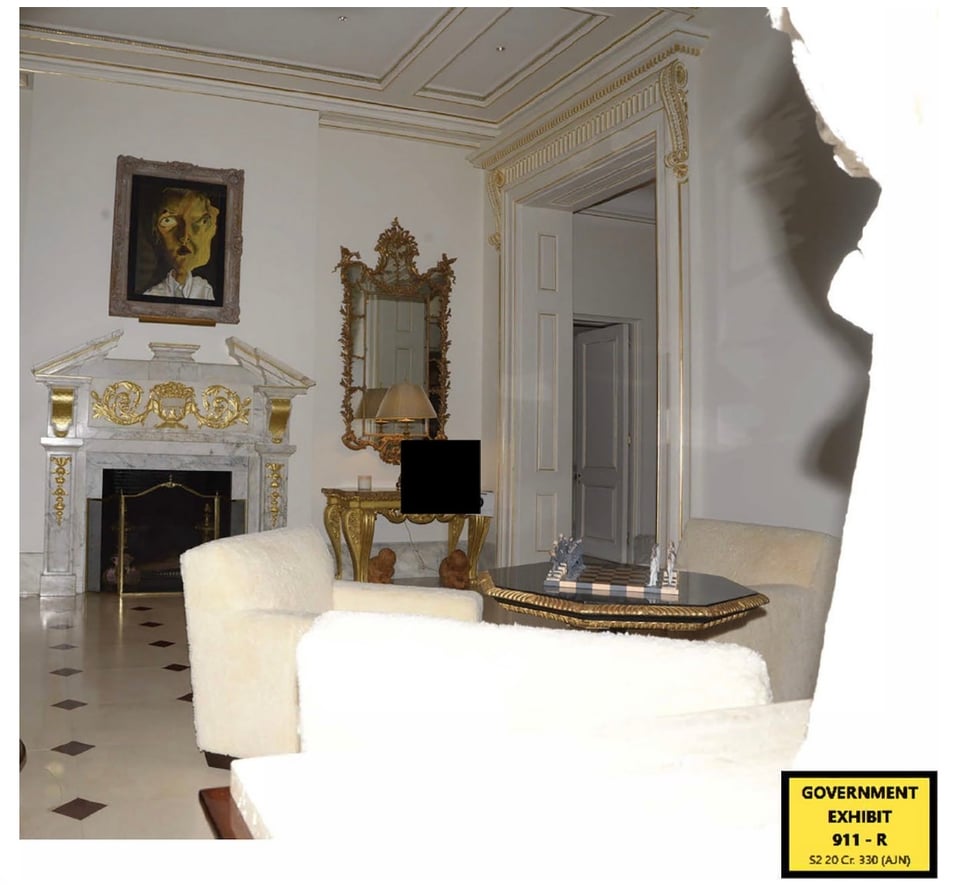
Jeffrey Epstein’s Upper East Side New York City home. Police raid images. Manhattan Federal Ghislaine Maxwell trial evidence exhibits. Courtesy of US District Court, Southern District of New York/FBI.
In the midst of a firestorm that Donald Trump can no longer contain regarding his refusal to release all materials concerning Epstein and his clients, Deputy Attorney General Todd Blanche (Trump’s former personal attorney) announced a meeting with Maxwell (whom Trump previously wished well). Maxwell is currently appealing her conviction. What could possibly be the basis for the number two person in the Justice Department to meet with the woman at the center of the criminal enterprise that now threatens to envelop Trump in a scandal like none other in his sordid career?
(Interestingly, Attorney General Pam Bondi, already the object of scorn for her insistence that there is no “list” to release, has now taken a back seat.)
The prospect for such a meeting has set off alarm bells, even within the MAGA camp. Rep. Marjorie Taylor Greene (R-Ga.) actually got something right when she proposed that Maxwell could be “bartering for something.” Put more bluntly, Maxwell could be making a deal to pardon or shorten her sentence in exchange for exonerating Trump. This would be the height of corruption, raising the potential for impeachment and/or criminal investigation.
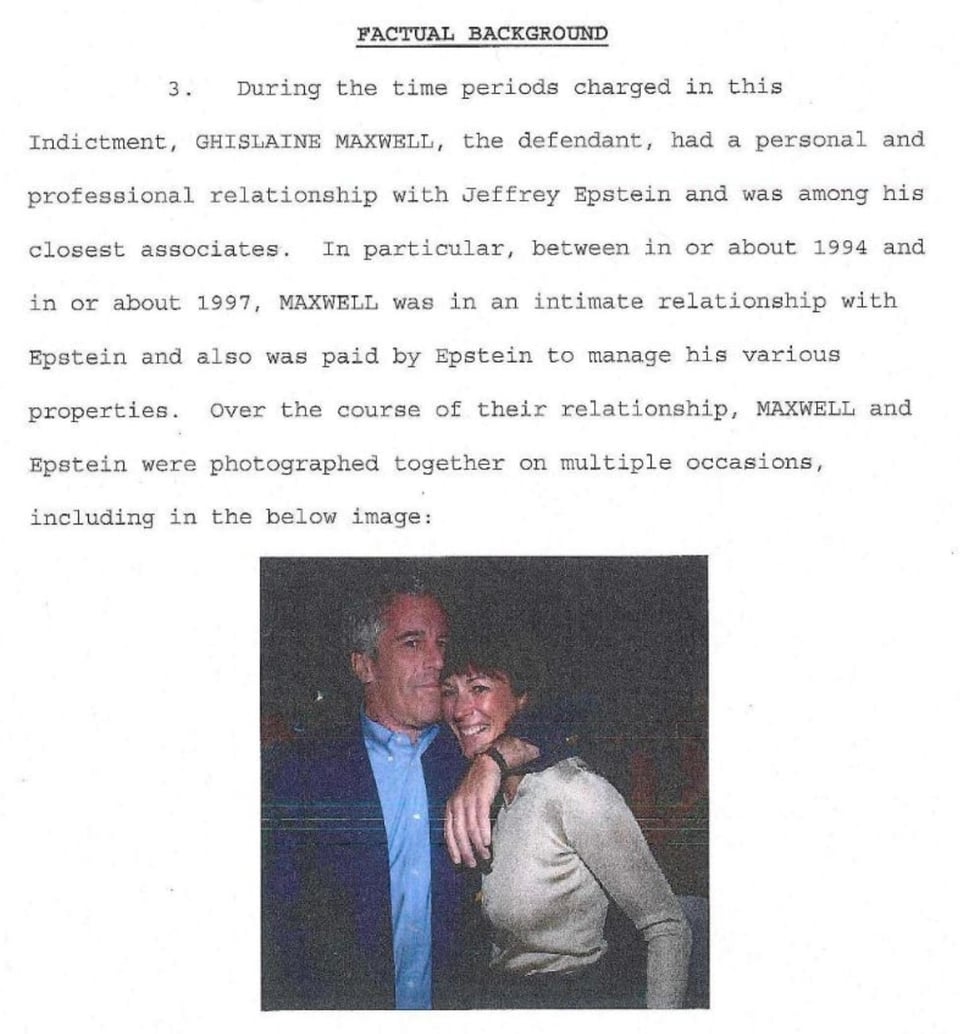
Indictment charging Ghislaine Maxwell with various crimes; United States District Court, Southern District of New York.
It seems preposterous that anyone would believe Maxwell’s possible exoneration of Trump after getting a deal from the ethically compromised Justice Department. However, Trump may be so desperate to persuade a segment of his most deluded cult members to let up that he is willing to risk elevating the scandal.
So far, it seems to be backfiring. On Tuesday, Rep. Tim Burchett (R-Tenn.) offered a motion in the House Oversight and Government Reform committee to subpoena Maxwell. It passed on a voice vote. Members of Congress will apparently be able to ask questions about Epstein’s associate, her contact with the Trump Justice Department, and the existence of documents. While she might assert her 5th Amendment rights not to testify (so long as her case is on appeal), the questions posed in and of themselves should be enlightening.
Moreover, the scandal has forced the House to grind to a halt. “Republicans on the House Rules Committee continue to oppose allowing any legislation to reach the House floor for a vote this week,” the Washington Post reported. “That’s because they fear Democrats will introduce amendments related to Epstein. Democrats on the panel did so twice last week, and Republicans faced blowback from constituents and the MAGA base for voting against releasing the files.” The GOP chair of the committee said it might not meet again until September, and the House is set to scurry out of town for recess on Wednesday.
The Blanche meeting, like all the other attempts to divert attention (e.g., an appalling AI video showing President Obama’s arrest, the release of Martin Luther King, Jr. files, demands that the Guardians and Commanders revert to their previous names, and a threat to prosecute Trump nemesis, California Democratic Sen. Adam Schiff) is unlikely to quell the uproar. While clueless, cynical legacy media practicing access journalism might insist the issue is going away (or Trump, at least, is gaining the upper hand), these developments show the opposite.
Trump is in a frenzy. Republicans are no longer complacent about a coverup. The public overwhelmingly disapproves of his handling of the scandal. Social media continues to stay on the case. And now the spectacle of Maxwell’s testimony provides the opportunity for wall-to-wall coverage.
House members on both sides of the aisle are irate with Speaker Mike Johnson (R-La.), who refused to move forward with a vote to compel release of the documents. Rep. Tom Massie (R-Ky.) earned the ire of the Speaker (and Trump) after he scolded Johnson: “Who’s he gonna pick? Is he going to stand with the pedophiles and underage sex traffickers? Or is he gonna pick the American people and justice for the victims? … It’s irrespective of what the president wants.”
That comes close to the nub of the issue: Will Republicans go along with a massive coverup, the sort of corrupt self-protection racket that authoritarian leaders pull to defend indefensible conduct? The issue now threatens Trump’s survival as president—and, by extension, every Republican’s political career.
Once the MAGA GOP is seen as the party that protects rich, creepy, abusive, elite men at the expense of everyone else, they will be recognized for the villains they once claimed Democrats to be. After all, a deep state cover-up of sexual predators who victimized children should be the final straw for all but the most deluded Trump cultists. (Jennifer Rubin, The Contrarian).
3. Justice Department Told Trump in May That His Name Is Among Many in the Epstein Files
Bondi also told president at the meeting that Justice decided to not release more Jeffrey Epstein documents because of the presence of child pornography and the need to protect victims
When Justice Department officials reviewed what Attorney General Pam Bondi called a “truckload” of documents related to Jeffrey Epstein earlier this year, they discovered that Donald Trump’s name appeared multiple times, according to senior administration officials.
In May, Bondi and her deputy informed the president at a meeting in the White House that his name was in the Epstein files, the officials said. Many other high-profile figures were also named, Trump was told. Being mentioned in the records isn’t a sign of wrongdoing.
The officials said it was a routine briefing that covered a number of topics and that Trump’s appearance in the documents wasn’t the focus.
They told the president at the meeting that the files contained what officials felt was unverified hearsay about many people, including Trump, who had socialized with Epstein in the past, some of the officials said. One of the officials familiar with the documents said they contain hundreds of other names.
They also told Trump that senior Justice Department officials didn’t plan to release any more documents related to the investigation of the convicted sex offender because the material contained child pornography and victims’ personal information, the officials said. Trump said at the meeting he would defer to the Justice Department’s decision to not release any further files.
The meeting set the stage for the high-profile review to come to an end. Bondi had said in February that Epstein’s client list was “sitting on my desk right now to review.” Trump said last week in response to a journalist’s question that Bondi hadn’t told him that his name was in the files.
The administration didn’t publicly announce the decision until weeks later on July 7, when the Justice Department posted a memo on its website. The statement, which was unsigned, stated that a thorough review had turned up no list of Epstein’s clients, no evidence that would lead to an investigation of uncharged third parties and no additional documents that merited public disclosure. It said that much of the material would have been sealed in a trial to protect victims and to block the dissemination of child pornography.
Typically, the FBI doesn’t disclose materials that aren’t related to a charged offense.
“This is another fake news story, just like the previous story by The Wall Street Journal,” said White House communications director Steven Cheung.
A message projected on the U.S. Chamber of Commerce building across from the White House on July 18. PHOTO: ALEX WROBLEWSKI/AGENCE FRANCE-PRESSE/GETTY IMAGES
In a statement to the Journal on Friday, Bondi and the deputy attorney general, Todd Blanche, said nothing in the files warranted further investigation or prosecution. “As part of our routine briefing, we made the President aware of the findings,” they said.
On Tuesday, Blanche said on X that the Justice Department was seeking to arrange a meeting with Ghislaine Maxwell in the coming days to discuss any possible information about anyone who has committed crimes with Epstein.
Maxwell was found guilty in 2021 of helping Epstein’s sex trafficking and sentenced to 20 years in prison. She has been in custody since she was charged in 2020 and didn’t testify at her trial.
One of Maxwell’s lawyers, David Oscar Markus, confirmed the discussions and said, “We are grateful to President Trump for his commitment to uncovering the truth in this case.” Maxwell has been seeking to have her conviction overturned, contending she didn’t receive a fair trial.
Both Epstein and Trump said years ago that they had a falling out. Trump has said their friendship ended before the financier was indicted for soliciting prostitution in 2006. Epstein later pleaded guilty to procuring a minor for prostitution in 2008, served time in a Florida jail and registered as a sex offender. When Epstein was arrested again in 2019, Trump said he hadn’t talked to Epstein for about 15 years. Epstein died in jail that year while awaiting trial on federal charges of sex trafficking.
FBI Director Kash Patel has privately told other government officials that Trump’s name appeared in the files, according to people close to the administration.
Patel declined to answer an inquiry from the Journal about the Epstein case, but said in a statement that the memo on the Justice Department website explaining why the department wouldn’t release more Epstein documents was “consistent with the thorough review conducted by the FBI and DOJ.”
Details of Bondi’s meeting with Trump haven’t been previously reported. Trump’s advisers had for months, including during the presidential campaign, said they would release the files, and Trump, while at times equivocal, indicated he would support the release.
Trump’s supporters, including some now serving in senior roles in the administration, claimed that the documents would expose global elites and powerful Democrats who spent time with the disgraced financier.
The decision to not release the files has triggered the most serious backlash from Trump’s political base since he launched his bid for the White House a decade ago, with a vocal group of the president’s allies seeing the move as a massive betrayal.
Trump has told administration officials in recent weeks that he wanted the growing public attention on Epstein to go away. On Tuesday, House Speaker Mike Johnson cut short the legislative session as some lawmakers demanded votes on more releases related to the Epstein files.
Grand jury testimony
Last Thursday, The Wall Street Journal published an article about a letter bearing Trump’s name that was included in a 2003 birthday album for Epstein, which was assembled before the financier was first charged. On Friday, Trump sued the Journal’s reporters, Journal publisher Dow Jones, parent company News Corp and executives, calling the letter “nonexistent” and alleging the article defamed him.
A spokeswoman for Dow Jones said, “We have full confidence in the rigor and accuracy of our reporting, and will vigorously defend against any lawsuit.”
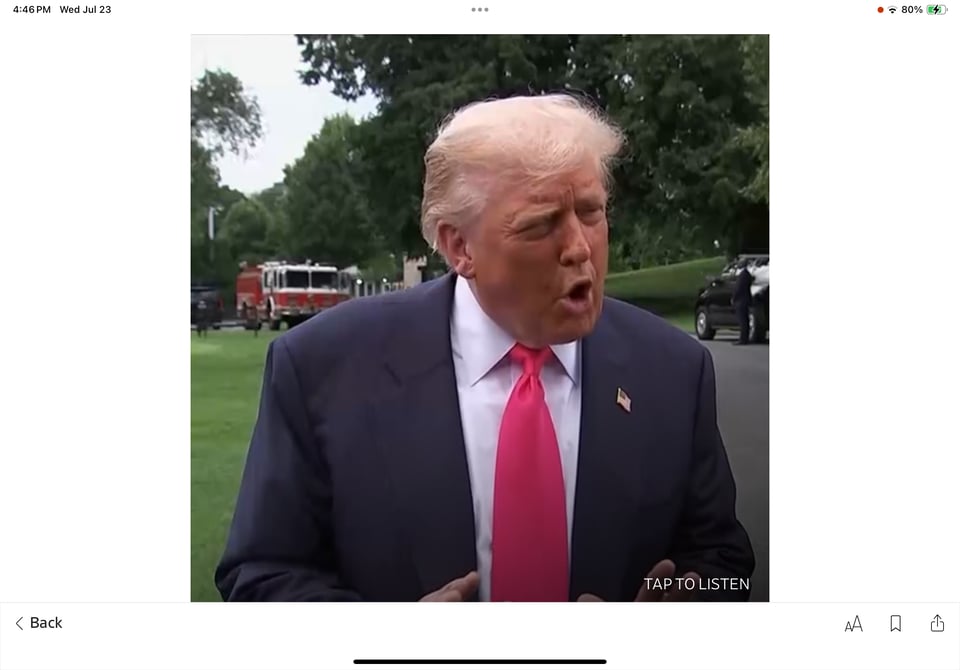
Trump responded to a question about the files from an ABC News journalist on July 15. U.S. NETWORK POOL
Pages from the leather-bound album are among the documents examined by Justice Department officials who investigated Epstein years ago, according to people who have reviewed the pages. It’s unclear if any of the pages are part of the Trump administration’s recent review.
On Thursday, Trump said he had directed Bondi to “produce any and all pertinent Grand Jury testimony, subject to Court approval!” On Friday, Bondi and Blanche asked a federal court to do so, saying it was “a matter of public interest.”
The grand jury testimony makes up only a portion of the more than 300 gigabytes of Epstein-related material the FBI compiled as part of the recent review. Among other material, the FBI confiscated digital and documentary evidence from Epstein’s properties in the U.S. Virgin Islands and New York in 2019 when he was arrested.
Grand jury testimony is subject to secrecy protections and faces potentially high hurdles for public release. Administration officials privately acknowledge that the court is unlikely to release the testimony.
On July 15, an ABC News journalist asked Trump, as he took questions from reporters at the White House, what Bondi told him about the Epstein files: “Specifically, did she tell you at all that your name appeared in the files?”
“No, no, she’s—she’s given us just a very quick briefing,” Trump responded. He also said Bondi had “really done a very good job” on the Epstein review.
Bondi-Bongino clash
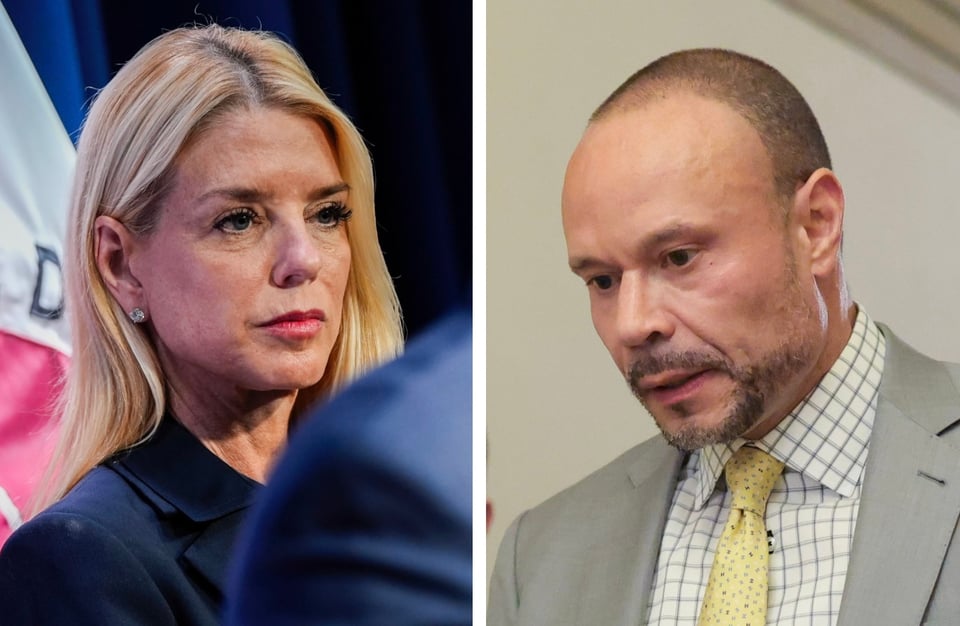
Bondi clashed with Dan Bongino, the deputy FBI director, about releasing the files. JULIA DEMAREE NIKHINSON/ASSOCIATED PRESS; KAYLA BARTKOWSKI/GETTY IMAGES
The decision to not release the files and the harsh fallout among the public has roiled some of Trump’s senior staff, who have staked their reputations on exposing the ties between Epstein and moneyed elites.
Patel, the FBI director, and his deputy, Dan Bongino, had been in favor of releasing more documents, people familiar with their efforts said.
Bongino has told colleagues that his association with the administration’s decision to keep the files private has eroded his credibility among the base of support that fueled his rise as a successful podcaster and media personality on the right, according to a senior administration official. Bongino didn’t respond to requests for comment.
On July 9, after ABC News reached out to the White House about Bondi’s briefing to the president, Bongino and Bondi clashed in a meeting in which Bondi alleged that Bongino secretly provided information to the media to damage her reputation, people familiar with the meeting said.
Bongino in turn exploded about Bondi, his face red, and called her a liar, a senior administration official said. (Wall Street Journal)
[4. House Panel Votes to Subpoena Justice Dept. for Epstein Files]
Three Republicans joined with five Democrats to support the motion.
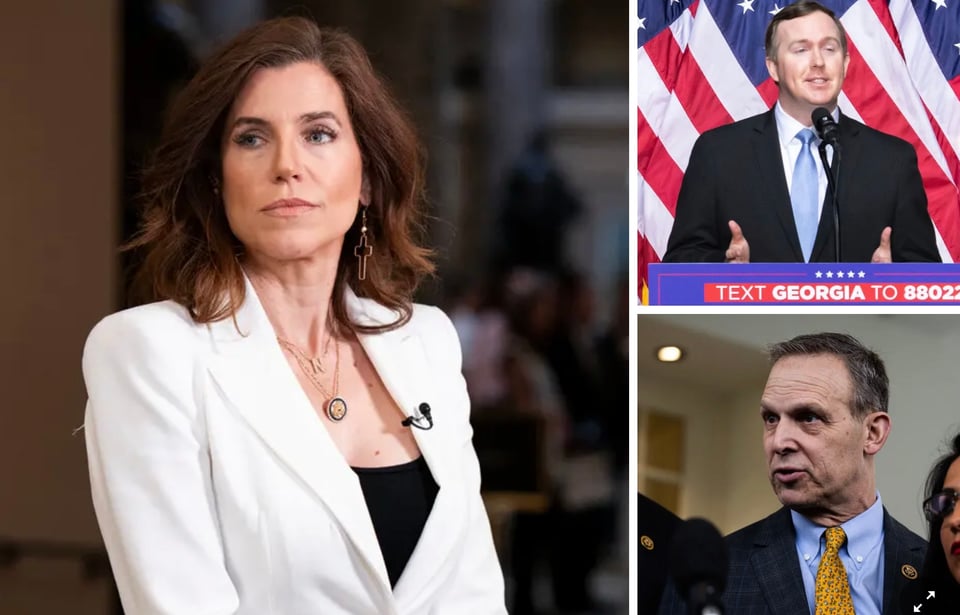
The Republicans on the committee panel who voted for the subpoena were Representatives Nancy Mace of South Carolina, Brian Jack of Georgia and Scott Perry of Pennsylvania
A key House subcommittee on Wednesday voted to subpoena the Justice Department for its files regarding the investigation into the accused sex trafficker Jeffrey Epstein, after a few Republicans broke with their party to join Democrats in backing the move.
The motion for a subpoena, introduced by Representative Summer Lee of Pennsylvania, was the latest effort by Democrats to force Republicans to go on the record about whether to release the Epstein files, an issue that has divided the G.O.P. It was precisely the kind of vote that Speaker Mike Johnson had sought to avoid when he announced on Tuesday that he would cut short the final week of legislative business in the House ahead of a scheduled five-week recess.
The Republicans who voted for the subpoena were Representatives Nancy Mace of South Carolina, Brian Jack of Georgia and Scott Perry of Pennsylvania. The House Oversight Committee’s panel on Federal Law Enforcement approved it on a vote of 8-2, with two Republicans opposed and five Democrats in favor.
According to the rules of the panel, the chairman, Representative James Comer, Republican of Kentucky, is required to issue subpoenas authorized by the committee or its subcommittees.
Before the final vote, Republicans added language to the subpoena that would require the Justice Department release any communications between former President Joseph R. Biden Jr. and the department about Mr. Epstein, redact information about Mr. Epstein’s victims and remove any material depicting children being sexually abused.
Republicans on the panel also voted for additional subpoenas connected to an investigation into Ghislaine Maxwell, a longtime associate of Mr. Epstein who is serving a 20-year prison term for sex trafficking and other crimes.
The Oversight Committee on Wednesday issued a subpoena to Ms. Maxwell for a deposition that is scheduled for Aug. 11 at the federal prison in Florida where she is currently in custody.
The new subpoenas included former President Bill Clinton and Hillary Clinton, the former secretary of state and one of Mr. Trump’s top political rivals; James B. Comey, the former F.B.I. director; Robert S. Mueller III, the special counsel who investigated Russian interference in the 2016 election; and a group of former U.S. attorneys general who served under both Democratic and Republican presidents, including Mr. Trump.
Representative Robert Garcia of California, the top Democrat on the Oversight Committee, called the subpoena a victory for government transparency.
“House Republicans didn’t make it easy, but the motion was finally passed to force the Department of Justice to release the Epstein files,” he said in a statement. “Let’s be clear: this is a huge win for the American people.” (New York Times)
5. About That Japan Deal by Paul Krugman.
Arithmetic has a well-known globalist bias
So the Trump administration has triumphantly announced a trade deal with Japan, and I guess I should post something about it, even though my regular morning post — on a completely different topic — is already up.
There are three main things you should take away from this deal:
- It will increase, not reduce, the U.S. trade deficit
- It will accelerate America’s descent into crony capitalism
- U.S. consumers are still facing a major price shock
The deal, as reported, involves imposing a tariff of “only” 15 percent on imports from Japan, mainly in return for a promise by the Japanese government to invest $550 billion in the United States. It appears that Japan will create a sovereign wealth fund for that purpose, and that Trump will have a say in how it invests.
So, first, the impact on the trade deficit. As I and others have repeatedly pointed out, there’s some basic arithmetic linking international investment and the trade balance.
A few technical details aside, U.S. trade deficit = Net foreign investment in the United States
This isn’t a theory, it’s just accounting. So if the deal leads to more investment in the U.S., it must, necessarily, lead to a bigger trade deficit.
How, exactly, would that work? The most likely channel is that capital inflow from Japan will lead to a stronger dollar than we would have had otherwise, making U.S. goods less competitive across the board.
It has been clear for a while that Trump and co. don’t understand or believe in balance of payments accounting, that they want both a smaller trade deficit and more foreign investment in America. Now their basic lack of understanding is embodied in a specific deal.
Second, as I said, it appears that Trump will get to influence how Japan invests. We’re already well on the way toward an economy in which success in business depends not on how good your product is but on your political influence (and also an economy in which Trump tells Coca-Cola what ingredients it should use.) This is another step on that road.
Finally, a 15 percent tariff is still really, really high — much higher than the 1.6 percent tariff Japanese non-agricultural exports faced before Trump began his trade war.
Will Japanese exporters, rather than U.S. consumers, end up paying that tariff? Some people have looked at the relatively muted effect of tariffs on consumer prices so far and suggested that maybe Trump was right about that. But they’re looking at the wrong data.
If foreigners were eating the tariffs, we’d expect to see a large decline in the prices America is paying for imports. And the BLS does, in fact, measure import prices; its index specifically does not include tariffs.
So let’s compare the increase in average tariffs from a year ago with the change in nonfuel import prices:
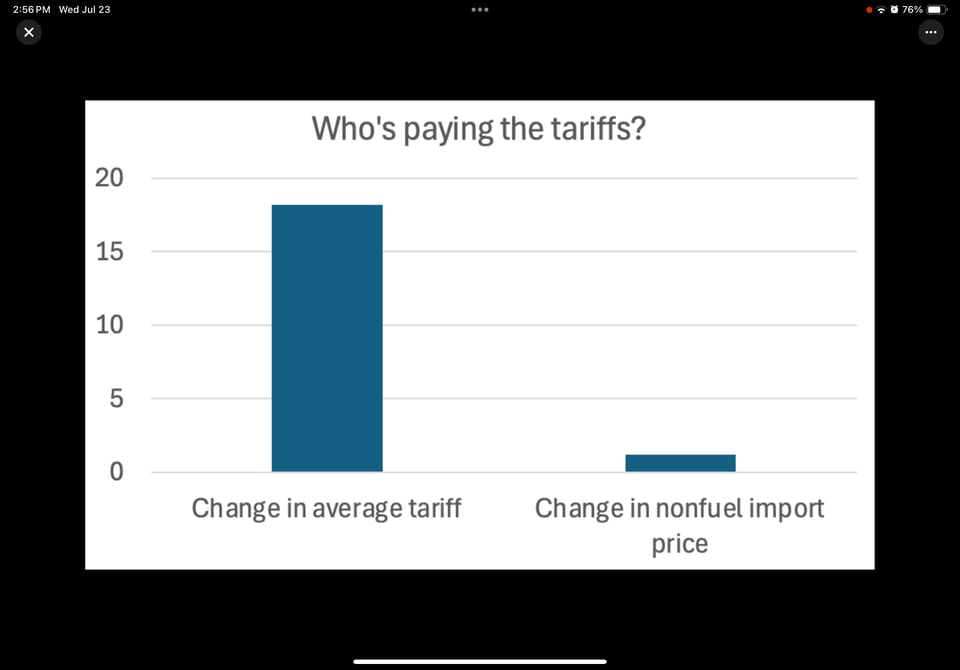
Source: Yale Budget Lab, Bureau of Labor Statistics
Have import prices fallen by enough to offset the tariff hikes? No, they’ve gone up slightly.
So why aren’t we seeing big increases in consumer prices yet? Basically because for the moment U.S. businesses are absorbing much of the cost rather than passing it on to consumers. They’ve been able to do that partly because many companies rushed to bring imports in before the tariffs hit, and are still selling out of that inventory. They’ve been willing to do that because they don’t want to alienate customers and lose market share, and have been hoping that the tariffs will mostly go away.
But if Japan still faces a 15 percent tariff after making a deal, that hope will soon fade. Winter Inflation is coming.
Update: Friends have been pointing out that this deal means that Japanese cars will pay 15 percent tariffs, while US car producers will still be paying 50 percent on imported steel. Not exactly a strategy to boost manufacturing. What were they thinking? They probably weren’t thinking. (Substack)